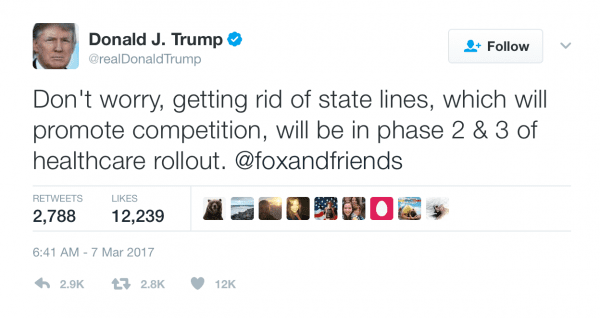Unfortunately, the AHCA’s efforts at replacing Obamacare’s health insurance exchanges are problematic. A key limitation is that Republicans have decided to repeal and replace Obamacare on a party-line vote using the Senate’s reconciliation process. But reconciliation can only repeal Obamacare’s taxes and spending; it can’t replace most of the law’s premium-hiking insurance regulations.
The AHCA does make an effort to repeal Obamacare’s two costliest regulations: its requirement that plans charge similar premiums to the young and the old (age-based community rating); and its requirement that plans contain generous financial payouts (high actuarial value). So far, so good.
But the plan, due to the reconciliation process, appears to leave the vast majority of Obamacare’s regulations in place. The February 10 leaked draft contained language that would have returned control of essential health benefits to the states. That language appears to have been deleted.
Worse still, the bill contains an arbitrary “continuous coverage” provision, in which those who sign up for coverage outside of the normal open enrollment period would pay a 30 percent surcharge to the normal insurance premium. This surcharge is an arbitrary price control. While 30 percent represents an approximate average of the additional health risk of late enrollees, the 30 percent provision incentivizes those who face much higher costs to sign up, forcing insurers to cover them at a loss. This seems like a recipe for adverse selection death spirals.
The critical mistake of the AHCA is its insistence on flat, non-means-tested tax credits. The flat credit will price many poor and vulnerable people out of the health insurance market.
As I wrote last month, the AHCA creates a steep benefit cliff between those on Medicaid (subsidizing approximately $6,000 per patient per year), and those just above the poverty line who will get tax credits of about $3,000. People just below poverty will be strongly disincentivized to make more money, effectively trapping them in poverty.
You want to lose your majority? Because this is how you lose your majority.
But here’s what Trump said this morning:

This is more cause for hope than Philip Klein’s take earlier today, but remain wary of Congress ever getting to Phase Two after they can safely claim to have “done something” about ObamaCare.
